erlang
ch 15. Rage Against The Finite-State Machines
Finite-State Machines??
- 한번에 하나의 상태만을 가짐
event를 통해 상태를 전환gen_fsm(deprecated) 또는get_statem
읽은 소감?
- 저자가 (갑자기) 설명충이 된 느낌?? (너무 복잡한 예제...)
- 읽기 전에는 "오 상태머신이 있다고?"
- 읽은 후에는 "아직도 이해가 안되네 😕"
gen_fsm이 deprecated 되어 동기부여마저 떨어짐- 하지만, 2개의 fsm 이 통신하는 부분은 아주 흥미로움
gen_statem
gen_statemprovides a generic state machine behaviour and replaces its predecessorgen_fsmsince Erlang/OTP 20.0.- 2가지
callback mode지원 - Event postponing, State time-out ...
- 미래가 있어보이는
gen_statem으로 진행함
pushbutton module
trade_fsm이 너무 어려워서gen_statem에 나와있는pushbutton예제를 사용하기로...- 2가지 상태만 있는 아주 간단한 state machine
Loading...
run pushbutton
pushbutton.erl
ch 16. Event Handlers
gen_event
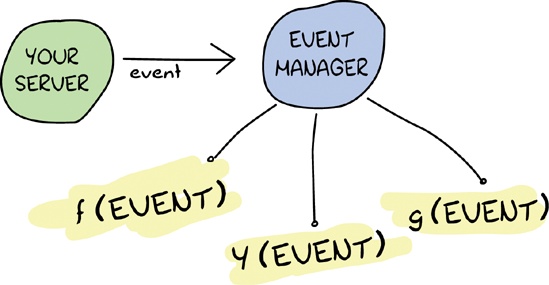
- 이벤트를 subscriber (함수) 로 포워딩 해주는 프로세스
- 이벤트가 처리되는 handler 함수를 여러 모듈에 나누어 구현하고, 동적으로 추가 / 삭제가 가능함
event manager와handler는 같은 프로세스에서 실행됨
run curling_scoreboard
gen_event:add_sup_handler/3
caller프로세스가 크래시되면, 등록된handler를 자동으로 삭제처리handler가 삭제되면,caller프로세스에 자동으로 메시지 전달
읽은 소감?
gen_event는gen_server의 이벤트 처리 특화버전?handler가 같은 프로세스에서 처리되기 때문에 blocking 에 유의해야 함
ch 17. Who Supervises the Supervisors?
supervisor
callback은init/1뿐이지만, 가장 복잡한 옵션을 가지고 있는 behaviour 🧙♂️- erlang 프로세스를 감시할 수 있음
- supervision tree 를 순서에 맞게 종료시켜 줌
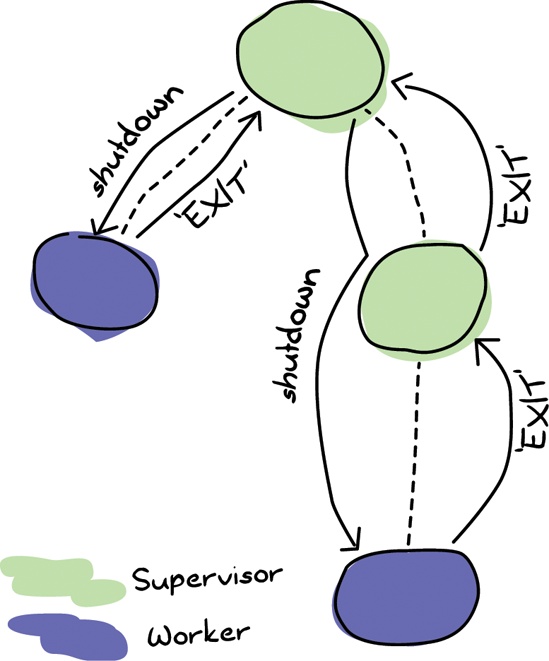
init/1 callback
{ok, {{RestartStrategy, MaxRestart, MaxTime}, [ChildSpec]}}
RestartStrategy
one_for_one, one_for_all, rest_for_one, simple_one_for_one
- MaxTime 내에 MaxRestart 되면, supervisor 스스로 종료
ChildSpec
[{id, MFA, restart, shutdown, type, modules}, ...]
읽은 소감?
erlang 의
supervisor는 실행 이후 child process 를 추가 / 삭제 가능- elixir 에서는
Supervisor와DynamicSupervisor를 구분함
- elixir 에서는
- 프로세스를 관찰하고자 한다면,
supervisor로...
1> band_supervisor:start_link(lenient).
{ok,0.709.0>}
2> supervisor:which_children(band_supervisor).
[{keytar,<0.713.0>,worker,[musicians]},
{drum,<0.715.0>,worker,[musicians]},
{bass,<0.711.0>,worker,[musicians]},
{singer,<0.710.0>,worker,[musicians]}]
ch 18. Building an Application With OTP
ppool
- 태스크를 실행할 수 있는 process pool 과 queue 를 가진 OTP 앱
gen_server,supervisor를 활용해서 뭔가 쓸모있는 것을 만들기 시작함- OTP 앱에 반드시 존재하는 supervision tree 를 모델링 하는 방식을 잠깐 소개 (Onion Layer Theory??)
Onion Layer Theory??
앱에 필요한 state 를 타입별로 나눠보면, supervision tree 를 구성하는데 도움을 받을 수 있다.
static state➡️ supervisordynamic state (can recompute)➡️ other process, db, envdynamic state (cannot recompute)➡️ other process (gen_server??)
ppool's supervision tree
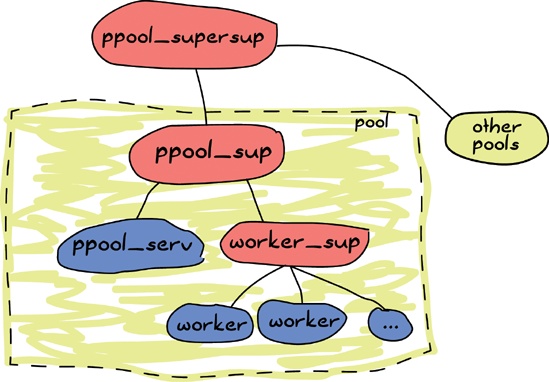
ch 19. Building OTP Applications
directory structure
Emakefile
{"src/*", [debug_info, {i,"include/"}, {outdir, "ebin/"}]}.
{"test/*", [debug_info, {i,"include/"}, {outdir, "ebin/"}]}.
Application Resource File
{application, ppool,
[{vsn, "1.0.0"},
{modules, [
ppool,
ppool_serv,
ppool_sup,
ppool_supersup,
ppool_worker_sup
]},
{registered, [ppool]},
{mod, {ppool, []}}
]}.
Application Behaviour
Application Controller
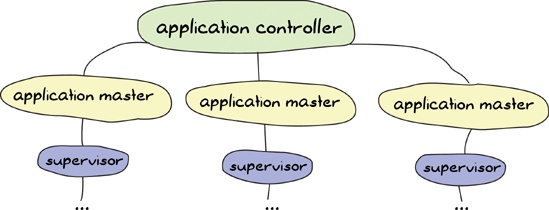
- erlang vm 과 함께 시작
각 OTP 앱을 관리하는 application master 를 시작
ppool앱도 application master 에서 시작됨
- 우리 앱을 observer 앱에서 관찰할 수 있음 🎉
run ppool app
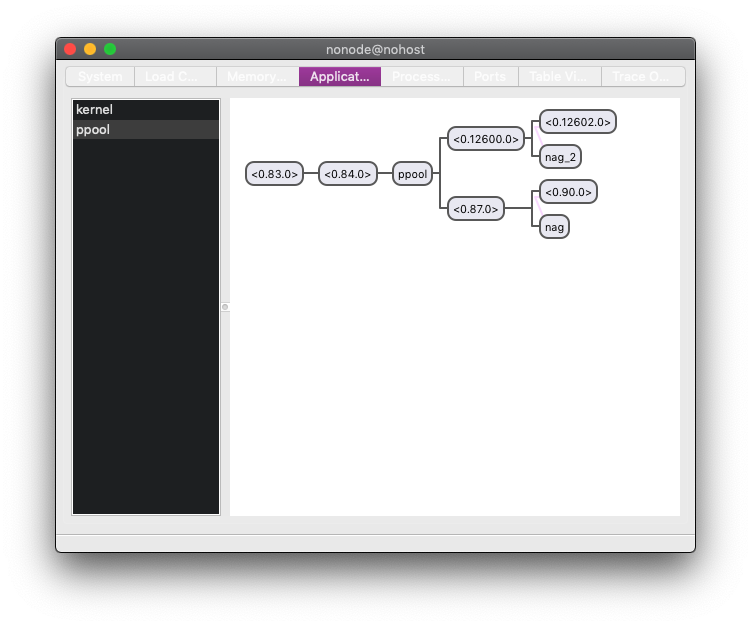
읽은 소감?
- 이전의 데모들도 application behaviour 를 구현하고, observer 에서 확인해보고 싶어졌음
- supervision tree 를 쉽게 확인할 수 있는 것은 좋은데, observer 에 표시되는 process 와 module 코드가 잘 연결될 수 있었으면 좋겠음